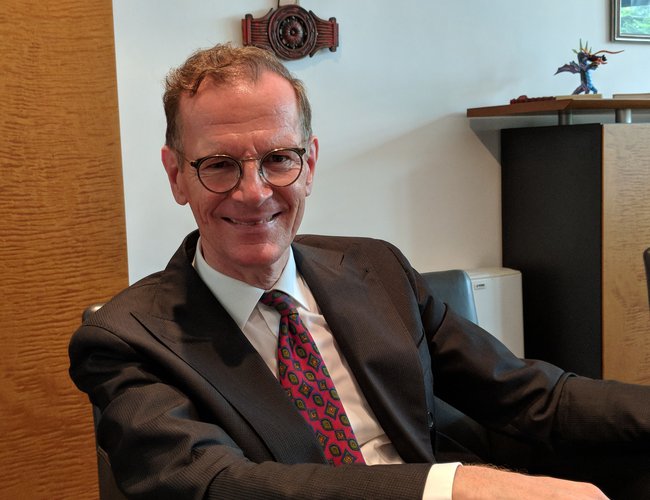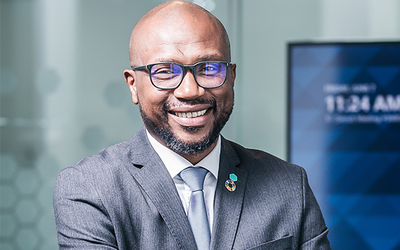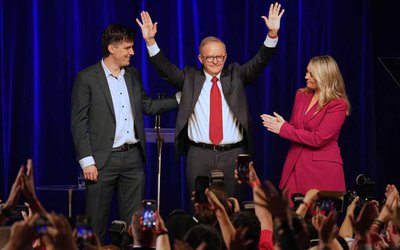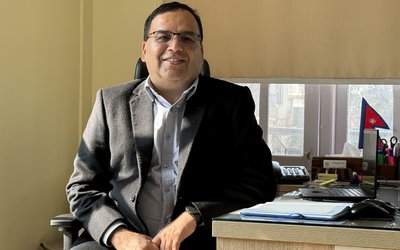
As Nepal and Germany are celebrating 60 years of establishment of their diplomatic relations, how do you describe the state of the bilateral relations at present?
Sixty years is a long time. If you look at the beginning of this diplomatic relationship, it was in 1958, you can see that we both have come a long way. We both have changed from what we were then. Nepal, an inward looking kingdom sixty years ago, has opened to the world and established democracy. Germany, which at that time had just emerged from Nazi Dictatorship and World War II as a devastated, divided country without full sovereignty, today is taking its global responsibilities as part of the European zone of peace, justice and prosperity. Germany is re-united and one of the most attractive and strongest exporting economies in the world.
How do you look at the support of Germany to Nepal?
The more I study records of these past sixty years, the more it becomes clear that Germany has sincerely tried to work for the good of the people, not just of the elites. Thus, we have been able to partner with Nepal through different phases of its history. We worked here in the King’s time, the time of democratization and even in the conflict era, when the German Development Cooperation could continue its engagement. This is rather unique, I believe.
Today, both sides can take advantage of this history. And there is also the fact that Germans seem to relate with Nepalis very well. I can see this in the private contacts, by tourists and others who engage with the people of Nepal. There is a real sympathy. On this basis, the current phase of our relations, in this sixtiest year, seem to me one of the luckiest moments of our relationship. Germany is present as a partner just at the moment Nepal is entering into a new chapter of its history, with a democratic and stable government, with a chance of good economic development and already making valued contributions to rules based international relations. We are looking forward to accompanying Nepal in another sixty years.
Germany has been supporting Nepal’s major infrastructure like rural road, transmission line, hydropower generation, agriculture, local level institutional building, heritage sites and so many other areas, how do you see the outcome of that support?
So far as our development cooperation is concerned, we are happy with it. The investments of German Cooperation support essential parts of the Nepalese economy. If you look at Marsyangdi and Middle Marsyangdi power stations, they are still the backbones of hydropower creation in Nepal. We currently engage in securing safer transmission lines, essential for smooth delivery of power. We also support decentralized electricity generation which markedly contributes to poverty alleviation, especially in poorest parts of western Nepal, but also in other parts of the country. Another area of intervention that I would like to highlight is our support to the roll out of a federal health insurance. It will have a huge positive impact for all the people in Nepal.
There is a lot of knowledge among the over 40 expatriats which are devoted to development cooperation and among the 200 Nepali specialists within the GIZ. It is not just about the physical results, but also about a huge human and knowledge capital and a long standing relationship. I trust this is a good basis for future cooperation...
How do you see the future of Cooperation?
We are working to use this relationship and this knowledge as a core basis for new forms of cooperation. Together with Nepal’s government and Nepali partners we wish to foster private investment into the promising sectors of Nepal’s economy, where it is needed. It is our wish to continue to work on health, energy as well as Small and Medium Size Enterprises (SMES). Especially on the last part, where the challenge is to develop Nepali capacity to compete in the world market, we will need to work closely with all three levels of government, and all of us then with the private sector. How to achieve results in the best form will be discussed with the central government representatives in the government to government negotiations in Berlin, in September this year. I am confident because in recent Nepali-German consultations there was excellent understanding and good will on both sides. And by the way, don’t forget the European Union’s contribution. We are part of it and coordinate closely with our colleagues.
How easy is it for private sector to come forward?
Of course, the development of private sector investment is a very important challenge. Together with an effective and well functioning justice system, it is the condition for a stable democracy and economic development. When I listened to Prime Minister K.P. Sharma Oli setting out his agenda at the beginning of his term, I was happy to see that this is his agenda for the development of his country. Of course, in due time, laws and the bureaucracy must follow suit. People must feel that the promises become reality. Then they will invest and create jobs. Germany wishes to work as an honest partner with all three levels of government to achieve a positive environment for private enterprise and the creation of jobs.
As you have mentioned about the development of private sector, Germany has always been promoting Nepal’s private sector by giving preferential treatment to some of Nepal’s products like carpet, handicraft and orthodox[VF1] tea. What kinds of support does Nepalese private sector require for future?
If you talk about the carpet industry and trade, it harks back to Nepal as a trading place between North and South. However, I do believe that trading is just a fraction of what Nepal can do and what it needs for its development. Nepal has more to offer than trading, even in valuable things such as carpets. There is so much Nepal can contribute where it can develop its competitive advantage and international trust. Look at its agriculture, not a big scale but specialized organic agriculture, especially medicinal herbs and specific products, which only grow in the mountains. And there is something many Nepalis don’t’ see at all, but for Germans it is easy to perceive: Nepal also needs to explore the possibility of producing high value added products, such as the production of high-quality electronic components.There actually is a German firm around here which is successfully producing small electronic components for German cars since 20 years. Good money, stable jobs, excellent reputation.
Do you think Nepal can go for high tech?
Given Nepal’s own tradition, this may be promising. If you look at all the skills which Nepalis have developed, they are outstanding. If you look at the Newari with their wooden carving, stone craft and arts, but also other communities, there is a lot of technical understanding among all parts of Nepali people. This is a treasure which has not yet been completely lifted to the public eye. I think there is so much more to be done in terms of technical skills and the treatment of material needed for industrial production. Although it is not yet common wisdom, here is a promise I can see, and some other keen observers like my US colleague have seen it, too.
Don’t you think there is a need of technical education?
Technical professional education is the backbone of productivity, of competitiveness and therefore of stable jobs. This is another subject we hope to develop in the future. If you look at the technical and professional training in Germany, you will find we have a very sophisticated but also solid and practical system. Successful firms train people in-house while cooperating closely with the state sponsored system of studies. This can be considered the secret of German productivity and of the success of German industries throughout the world. This training provides for the good cooperation between well paid and well trained workers and the engineers who design and continuously improve the production process. There are few countries which could be as open as Nepal today for testing this form of training. And few countries which could benefit as much of it. If Nepal can be that country, it will develop fast. I am happy that the first announcements of Prime Minister K.P. Sharma Oli, give a high priority to technical education. He said that technical education institutes should be established in every municipality of Nepal. This is a good spirit.
Do you think Nepal’s development partners support Nepal?
We, together with other development partners, would like to continue the good work in Nepal, and as you have seen, the moment is good, because there is basic convergence with what the Nepali people hope for. It is not just States who partner with Nepal. NGO’s are important, too, and must be given freedom to act creatively and responsibly. And of course, private investment will become more and more important. Some German firms are already active in development activities, such as establishing technical training centers. Voith, with its huge expertise in hydropower, is planning to train Nepali workers in specific skills for hydropower development. That is high quality training - please don’t think it is an easy way forward for a school dropout, it is definitely a path for a good student and a good worker. Because it is so important, we have professional training sections also in our technical cooperation in health and energy. This linkage between public and private partners should condition the future.
Germany is one of the major partners of earthquake reconstruction, how do you see the earthquake reconstruction process?
Apart from the official German aid - some 30 million Euros - the outpour of private engagement, even from tourists with trekking experience, was so striking. They gave money in huge amounts. Did all this money produce what they wanted? I think you are always impatient, you want to help the people and you want to see the results. I have not visited all of Nepal yet, but when I travelled to some places, I saw reconstruction is going on in quite some places and a lot of solidarity is there among Nepali citizens themselves. We Germans are proud to have rebuilt health stations and schools mainly in Sindhupalchowk, Rasuwa, Dhading and Nuwakot. Yes, there are still many public schools which need work. But given the challenges, I think we should not underestimate the achievements.
How do you see the school sector?
The most important thing is to see the children coming to school and the life in the school is back. I have been inaugurating good schools after they were reconstructed by GIZ and sometimes also Norwegian financial aid. I could see how reconstruction was intelligently linked to job training. I am happy to see that our colleagues from the European Union continue to engage directly with the education sector in Nepal.
How do you see Nepal’s peace process given your own observation of peace processes in other parts of the world?
I have always been an advocate of taking an outside view of the peace process before evaluating it. Do not look at Nepal alone, but compare it. By the way, I never use the word model. There is no Colombian model or South African model which could be followed as if it were a cooking recipe. Each country has to find its own way towards peace. But sharing experiences, comparing and getting a baseline, that definitely helps. With this in mind, I have always drawn the conclusion that Nepal already achieved a lot. Finishing the civil war before one side completely wiped out the other is good. Living together in a form of democracy for several years of constructing a constitution and adopting it successfully was a big effort and eventually, a success. Integrating Maoist fighters into society and army is another great success. Having democratic elections and forming a government under a united party, marks a completely new beginning. Overall a successful process, but it is not finished yet.
What about your impression on Transitional Justice system?
Prime Minister Oli’s government has embarked on the last chapter of peace process -- the transitional justice. I found this very positive. After a long wait under previous governments, the government of Prime Minister Oli moved rather fast, in comparison. The draft of a reform law was submitted to the public already in June – not such a long time after the composition of the government was settled. If you take the outside view – which an ambassador must take -, it is a step in the right direction.
How as an outsider can you help Nepal to achieve the success?
We can compare, we can encourage. However, we cannot decide and we don’t give models either. I am sure that Prime Minister Oli’s government is able to design a meaningful consultation process, giving it space and time. Those who will eventually adopt the reform law really need to listen to the victims, and to all categories of victims, even the ones who are often forgotten, such as women and former child soldiers. All should get a chance to be involved. Let us not forget that the army too, has had victims as well as perpetrators. This is a huge organizational task which only the government can undertake.. It will be a big challenge but I can perceive a big chance as well. Could it become a tool to strengthen the link between the citizen and the democratic state she belongs to? Of course, Nepal must abide by its international obligations, and there is still work to be done. We are not at a stage of judging that yet, because the process of consultation is yet to come, and I think there are chances of it becoming a success, if the government continues to show strong political commitment, in a steadfast way.
How do you see the federal structure in Nepal?
A federal structure in Nepal was introduced as a political instrument to tackle injustice, exclusion, caste system, economic disparities and leaving so many people behind. We have to understand that this is a political objective and not just an administrative one. With this in mind, the governments in the provinces and the governments in the municipal areas need to show results to the citizens in terms of policy and economic chances and development and individual justice to everybody. That is the secret of successful federalism, which always has this political component.
How are you supporting Nepal’s journey to federalism?
I come from a country which has always been federal since its States were pulled together in the nineteenth Century. Again: there is no model. What we are doing is helping to share experiences, not so much between German and Nepali municipalities, but between different Nepali municipalities. This has a long tradition. We are working closely to enhance the capacities of municipalities, but mostly through peer learning. I have visited some municipalities recently. It was encouraging to launch a manual on best practices of municipal administration which was written by Nepali mayors for Nepali mayors in Nepali. We hope that this experience can be helpful also at the level of provincial governments. The only thing we bring from our own experience is that federalism works best if it is cooperative, if the three levels of government join hands to achieve results. This is also the lesson which German judges bring to their Nepali colleagues when they hold seminars in Nepal, such as the upcoming one in August.

Keshab Poudel
Poudel is the editor of New Spotlight Magazine.
- FOURTH PROFESSOR Y.N. KHANAL LECTURE: Nepal-China Relations
- Jun 23, 2025
- Colonel JP CROSS: Centenary Birthday
- Jun 23, 2025
- REEEP-GREEN: Empowering Communities with MEP
- Jun 16, 2025
- BEEN: Retrofitted For Green
- May 28, 2025
- GGGI has been promoting green growth in Nepal for a decade: Dr. Malle Fofana
- May 21, 2025















